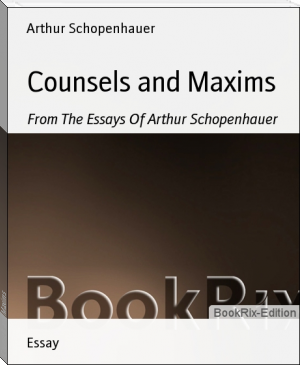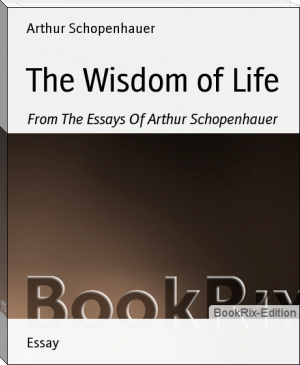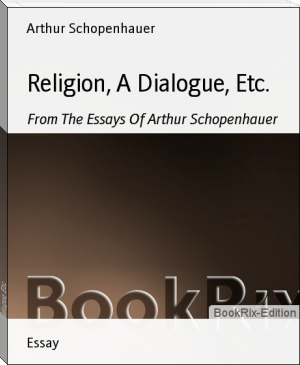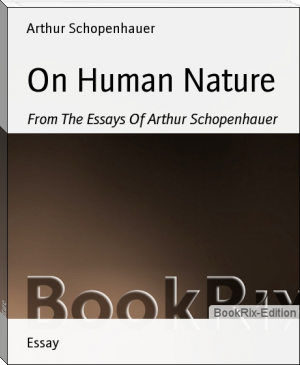Counsels and Maxims - Arthur Schopenhauer (dar e dil novel online reading TXT) 📗

- Author: Arthur Schopenhauer
Book online «Counsels and Maxims - Arthur Schopenhauer (dar e dil novel online reading TXT) 📗». Author Arthur Schopenhauer
seemed to them so much easier than to secure pleasure. Deeply impressed as they were by the negative nature of pleasure and the positive nature of pain, they consistently devoted all their efforts to the avoidance of pain. The first step to that end was, in their opinion, a complete and deliberate repudiation of pleasure, as something which served only to entrap the victim in order that he might be delivered over to pain.
[Footnote 1: Welt als Wille und Vorstellung , vol. ii., ch. 16.]
We are all born, as Schiller says, in Arcadia. In other words, we come into the world full of claims to happiness and pleasure, and we cherish the fond hope of making them good. But, as a rule, Fate soon teaches us, in a rough and ready way that we really possess nothing at all, but that everything in the world is at its command, in virtue of an unassailable right, not only to all we have or acquire, to wife or child, but even to our very limbs, our arms, legs, eyes and ears, nay, even to the nose in the middle of our face. And in any case, after some little time, we learn by experience that happiness and pleasure are a fata morgana , which, visible from afar, vanish as we approach; that, on the other hand, suffering and pain are a reality, which makes its presence felt without any intermediary, and for its effect, stands in no need of illusion or the play of false hope.
If the teaching of experience bears fruit in us, we soon give up the pursuit of pleasure and happiness, and think much more about making ourselves secure against the attacks of pain and suffering. We see that the best the world has to offer is an existence free from pain - a quiet, tolerable life; and we confine our claims to this, as to something we can more surely hope to achieve. For the safest way of not being very miserable is not to expect to be very happy. Merck, the friend of Goethe's youth, was conscious of this truth when he wrote: It is the wretched way people have of setting up a claim to happiness - and, that to, in a measure corresponding with their desires - that ruins everything in this world. A man will make progress if he can get rid of this claim,[1] and desire nothing but what he sees before him . Accordingly it is advisable to put very moderate limits upon our expectations of pleasure, possessions, rank, honor and so on; because it is just this striving and struggling to be happy, to dazzle the world, to lead a life full of pleasure, which entail great misfortune. It is prudent and wise, I say, to reduce one's claims, if only for the reason that it is extremely easy to be very unhappy; while to be very happy is not indeed difficult, but quite impossible. With justice sings the poet of life's wisdom:
Auream quisquis mediocritatem
Diligit, tutus caret obsoleti
Sordibus tecti, caret invidenda
Sobrius aula.
Savius ventis agitatur ingens
Pinus: et celsae graviori casu
Decidunt turres; feriuntque summos
Fulgura monies.[2]
- the golden mean is best - to live free from the squalor of a mean abode, and yet not be a mark for envy. It is the tall pine which is cruelly shaken by the wind, the highest summits that are struck in the storm, and the lofty towers that fall so heavily.
[Footnote 1: Letters to and from Merck.]
[Footnote 2: Horace. Odes II. x.]
He who has taken to heart the teaching of my philosophy - who knows, therefore, that our whole existence is something which had better not have been, and that to disown and disclaim it is the highest wisdom - he will have no great expectations from anything or any condition in life: he will spend passion upon nothing in the world, nor lament over-much if he fails in any of his undertakings. He will feel the deep truth of what Plato[1] says: [Greek: oute ti ton anthropinon haxion on megalaes spondaes] - nothing in human affairs is worth any great anxiety; or, as the Persian poet has it,
Though from thy grasp all worldly things should flee,
Grieve not for them, for they are nothing worth:
And though a world in thy possession be,
Joy not, for worthless are the things of earth.
Since to that better world 'tis given to thee
To pass, speed on, for this is nothing worth. [2]
[Footnote 1: Republic , x. 604.]
[Footnote 2: Translator's Note . From the Anvár-i Suhailí - The Lights of Canopus - being the Persian version of the Table of Bidpai . Translated by E.B. Eastwick, ch. iii. Story vi., p. 289.]
The chief obstacle to our arriving at these salutary views is that hypocrisy of the world to which I have already alluded - an hypocrisy which should be early revealed to the young. Most of the glories of the world are mere outward show, like the scenes on a stage: there is nothing real about them. Ships festooned and hung with pennants, firing of cannon, illuminations, beating of drums and blowing of trumpets, shouting and applauding - these are all the outward sign, the pretence and suggestion, - as it were the hieroglyphic, - of joy : but just there, joy is, as a rule, not to be found; it is the only guest who has declined to be present at the festival. Where this guest may really be found, he comes generally without invitation; he is not formerly announced, but slips in quietly by himself sans facon ; often making his appearance under the most unimportant and trivial circumstances, and in the commonest company - anywhere, in short, but where the society is brilliant and distinguished. Joy is like the gold in the Australian mines - found only now and then, as it were, by the caprice of chance, and according to no rule or law; oftenest in very little grains, and very seldom in heaps. All that outward show which I have described, is only an attempt to make people believe that it is really joy which has come to the festival; and to produce this impression upon the spectators is, in fact, the whole object of it.
With mourning it is just the same. That long funeral procession, moving up so slowly; how melancholy it looks! what an endless row of carriages! But look into them - they are all empty; the coachmen of the whole town are the sole escort the dead man has to his grave. Eloquent picture of the friendship and esteem of the world! This is the falsehood, the hollowness, the hypocrisy of human affairs!
Take another example - a roomful of guests in full dress, being received with great ceremony. You could almost believe that this is a noble and distinguished company; but, as a matter of fact, it is compulsion, pain and boredom who are the real guests. For where many are invited, it is a rabble - even if they all wear stars. Really good society is everywhere of necessity very small. In brilliant festivals and noisy entertainments, there is always, at bottom, a sense of emptiness prevalent. A false tone is there: such gatherings are in strange contrast with the misery and barrenness of our existence. The contrast brings the true condition into greater relief. Still, these gatherings are effective from the outside; and that is just their purpose. Chamfort[1] makes the excellent remark that society - les cercles, les salons, ce qu'on appelle le monde - is like a miserable play, or a bad opera, without any interest in itself, but supported for a time by mechanical aid, costumes and scenery.
[Footnote 1: Translator's Note . Nicholas "Chamfort" (1741-94), a French miscellaneous writer, whose brilliant conversation, power of sarcasm, and epigrammic force, coupled with an extraordinary career, render him one of the most interesting and remarkable men of his time. Schopenhauer undoubtedly owed much to this writer, to whom he constantly refers.]
And so, too, with academies and chairs of philosophy. You have a kind of sign-board hung out to show the apparent abode of wisdom : but wisdom is another guest who declines the invitation; she is to be found elsewhere. The chiming of bells, ecclesiastical millinery, attitudes of devotion, insane antics - these are the pretence, the false show of piety . And so on. Everything in the world is like a hollow nut; there is little kernel anywhere, and when it does exist, it is still more rare to find it in the shell. You may look for it elsewhere, and find it, as a rule, only by chance.
SECTION 2. To estimate a man's condition in regard to happiness, it is necessary to ask, not what things please him, but what things trouble him; and the more trivial these things are in themselves, the happier the man will be. To be irritated by trifles, a man must be well off; for in misfortunes trifles are unfelt.
SECTION 3. Care should be taken not to build the happiness of life upon a broad foundation - not to require a great many things in order to be happy. For happiness on such a foundation is the most easily undermined; it offers many more opportunities for accidents; and accidents are always happening. The architecture of happiness follows a plan in this respect just the opposite of that adopted in every other case, where the broadest foundation offers the greatest security. Accordingly, to reduce your claims to the lowest possible degree, in comparison with your means, - of whatever kind these may be - is the surest way of avoiding extreme misfortune.
To make extensive preparations for life - no matter what form they may take - is one of the greatest and commonest of follies. Such preparations presuppose, in the first place, a long life, the full and complete term of years appointed to man - and how few reach it! and even if it be reached, it is still too short for all the plans that have been made; for to carry them out requites more time than was thought necessary at the beginning. And then how many mischances and obstacles stand in the way! how seldom the goal is ever reached in human affairs!
And lastly, even though the goal should be reached, the changes which Time works in us have been left out of the reckoning: we forget that the capacity whether for achievement or for enjoyment does not last a whole lifetime. So we often toil for things which are no longer suited to us when we attain them; and again, the years we spend in preparing for some work, unconsciously rob us of the power for carrying it out.
How often it happens that a man is unable to enjoy the wealth which he acquired at so much trouble and risk, and that the fruits of his labor are reserved for others; or that he is incapable of filling the position which he has won after so many years of toil and struggle. Fortune has come too late for him; or, contrarily, he has come too late for fortune, - when, for instance, he wants to achieve great things, say, in art
[Footnote 1: Welt als Wille und Vorstellung , vol. ii., ch. 16.]
We are all born, as Schiller says, in Arcadia. In other words, we come into the world full of claims to happiness and pleasure, and we cherish the fond hope of making them good. But, as a rule, Fate soon teaches us, in a rough and ready way that we really possess nothing at all, but that everything in the world is at its command, in virtue of an unassailable right, not only to all we have or acquire, to wife or child, but even to our very limbs, our arms, legs, eyes and ears, nay, even to the nose in the middle of our face. And in any case, after some little time, we learn by experience that happiness and pleasure are a fata morgana , which, visible from afar, vanish as we approach; that, on the other hand, suffering and pain are a reality, which makes its presence felt without any intermediary, and for its effect, stands in no need of illusion or the play of false hope.
If the teaching of experience bears fruit in us, we soon give up the pursuit of pleasure and happiness, and think much more about making ourselves secure against the attacks of pain and suffering. We see that the best the world has to offer is an existence free from pain - a quiet, tolerable life; and we confine our claims to this, as to something we can more surely hope to achieve. For the safest way of not being very miserable is not to expect to be very happy. Merck, the friend of Goethe's youth, was conscious of this truth when he wrote: It is the wretched way people have of setting up a claim to happiness - and, that to, in a measure corresponding with their desires - that ruins everything in this world. A man will make progress if he can get rid of this claim,[1] and desire nothing but what he sees before him . Accordingly it is advisable to put very moderate limits upon our expectations of pleasure, possessions, rank, honor and so on; because it is just this striving and struggling to be happy, to dazzle the world, to lead a life full of pleasure, which entail great misfortune. It is prudent and wise, I say, to reduce one's claims, if only for the reason that it is extremely easy to be very unhappy; while to be very happy is not indeed difficult, but quite impossible. With justice sings the poet of life's wisdom:
Auream quisquis mediocritatem
Diligit, tutus caret obsoleti
Sordibus tecti, caret invidenda
Sobrius aula.
Savius ventis agitatur ingens
Pinus: et celsae graviori casu
Decidunt turres; feriuntque summos
Fulgura monies.[2]
- the golden mean is best - to live free from the squalor of a mean abode, and yet not be a mark for envy. It is the tall pine which is cruelly shaken by the wind, the highest summits that are struck in the storm, and the lofty towers that fall so heavily.
[Footnote 1: Letters to and from Merck.]
[Footnote 2: Horace. Odes II. x.]
He who has taken to heart the teaching of my philosophy - who knows, therefore, that our whole existence is something which had better not have been, and that to disown and disclaim it is the highest wisdom - he will have no great expectations from anything or any condition in life: he will spend passion upon nothing in the world, nor lament over-much if he fails in any of his undertakings. He will feel the deep truth of what Plato[1] says: [Greek: oute ti ton anthropinon haxion on megalaes spondaes] - nothing in human affairs is worth any great anxiety; or, as the Persian poet has it,
Though from thy grasp all worldly things should flee,
Grieve not for them, for they are nothing worth:
And though a world in thy possession be,
Joy not, for worthless are the things of earth.
Since to that better world 'tis given to thee
To pass, speed on, for this is nothing worth. [2]
[Footnote 1: Republic , x. 604.]
[Footnote 2: Translator's Note . From the Anvár-i Suhailí - The Lights of Canopus - being the Persian version of the Table of Bidpai . Translated by E.B. Eastwick, ch. iii. Story vi., p. 289.]
The chief obstacle to our arriving at these salutary views is that hypocrisy of the world to which I have already alluded - an hypocrisy which should be early revealed to the young. Most of the glories of the world are mere outward show, like the scenes on a stage: there is nothing real about them. Ships festooned and hung with pennants, firing of cannon, illuminations, beating of drums and blowing of trumpets, shouting and applauding - these are all the outward sign, the pretence and suggestion, - as it were the hieroglyphic, - of joy : but just there, joy is, as a rule, not to be found; it is the only guest who has declined to be present at the festival. Where this guest may really be found, he comes generally without invitation; he is not formerly announced, but slips in quietly by himself sans facon ; often making his appearance under the most unimportant and trivial circumstances, and in the commonest company - anywhere, in short, but where the society is brilliant and distinguished. Joy is like the gold in the Australian mines - found only now and then, as it were, by the caprice of chance, and according to no rule or law; oftenest in very little grains, and very seldom in heaps. All that outward show which I have described, is only an attempt to make people believe that it is really joy which has come to the festival; and to produce this impression upon the spectators is, in fact, the whole object of it.
With mourning it is just the same. That long funeral procession, moving up so slowly; how melancholy it looks! what an endless row of carriages! But look into them - they are all empty; the coachmen of the whole town are the sole escort the dead man has to his grave. Eloquent picture of the friendship and esteem of the world! This is the falsehood, the hollowness, the hypocrisy of human affairs!
Take another example - a roomful of guests in full dress, being received with great ceremony. You could almost believe that this is a noble and distinguished company; but, as a matter of fact, it is compulsion, pain and boredom who are the real guests. For where many are invited, it is a rabble - even if they all wear stars. Really good society is everywhere of necessity very small. In brilliant festivals and noisy entertainments, there is always, at bottom, a sense of emptiness prevalent. A false tone is there: such gatherings are in strange contrast with the misery and barrenness of our existence. The contrast brings the true condition into greater relief. Still, these gatherings are effective from the outside; and that is just their purpose. Chamfort[1] makes the excellent remark that society - les cercles, les salons, ce qu'on appelle le monde - is like a miserable play, or a bad opera, without any interest in itself, but supported for a time by mechanical aid, costumes and scenery.
[Footnote 1: Translator's Note . Nicholas "Chamfort" (1741-94), a French miscellaneous writer, whose brilliant conversation, power of sarcasm, and epigrammic force, coupled with an extraordinary career, render him one of the most interesting and remarkable men of his time. Schopenhauer undoubtedly owed much to this writer, to whom he constantly refers.]
And so, too, with academies and chairs of philosophy. You have a kind of sign-board hung out to show the apparent abode of wisdom : but wisdom is another guest who declines the invitation; she is to be found elsewhere. The chiming of bells, ecclesiastical millinery, attitudes of devotion, insane antics - these are the pretence, the false show of piety . And so on. Everything in the world is like a hollow nut; there is little kernel anywhere, and when it does exist, it is still more rare to find it in the shell. You may look for it elsewhere, and find it, as a rule, only by chance.
SECTION 2. To estimate a man's condition in regard to happiness, it is necessary to ask, not what things please him, but what things trouble him; and the more trivial these things are in themselves, the happier the man will be. To be irritated by trifles, a man must be well off; for in misfortunes trifles are unfelt.
SECTION 3. Care should be taken not to build the happiness of life upon a broad foundation - not to require a great many things in order to be happy. For happiness on such a foundation is the most easily undermined; it offers many more opportunities for accidents; and accidents are always happening. The architecture of happiness follows a plan in this respect just the opposite of that adopted in every other case, where the broadest foundation offers the greatest security. Accordingly, to reduce your claims to the lowest possible degree, in comparison with your means, - of whatever kind these may be - is the surest way of avoiding extreme misfortune.
To make extensive preparations for life - no matter what form they may take - is one of the greatest and commonest of follies. Such preparations presuppose, in the first place, a long life, the full and complete term of years appointed to man - and how few reach it! and even if it be reached, it is still too short for all the plans that have been made; for to carry them out requites more time than was thought necessary at the beginning. And then how many mischances and obstacles stand in the way! how seldom the goal is ever reached in human affairs!
And lastly, even though the goal should be reached, the changes which Time works in us have been left out of the reckoning: we forget that the capacity whether for achievement or for enjoyment does not last a whole lifetime. So we often toil for things which are no longer suited to us when we attain them; and again, the years we spend in preparing for some work, unconsciously rob us of the power for carrying it out.
How often it happens that a man is unable to enjoy the wealth which he acquired at so much trouble and risk, and that the fruits of his labor are reserved for others; or that he is incapable of filling the position which he has won after so many years of toil and struggle. Fortune has come too late for him; or, contrarily, he has come too late for fortune, - when, for instance, he wants to achieve great things, say, in art
Free e-book «Counsels and Maxims - Arthur Schopenhauer (dar e dil novel online reading TXT) 📗» - read online now
Similar e-books:





Comments (0)